仁爱版七年级英语上册Unit3_Topic1_do和does引导的一般疑问句【精校版】
- 格式:pdf
- 大小:7.14 KB
- 文档页数:3

仁爱版七年级英语(上)第3单元全部知识点Unit 3 Getting TogetherTopic 1 Do you like English?Section A一、重要语句:➢(1)Could you please …? → (2)Sure.➢(3)Do you like English? → (4)Yes, I do./ No, I don’t.➢(5)Could you help me with my …? →(6)No problem. 二、语法知识:1.speak 讲、说(某种语言)E.g. He can speak English .2.Could you please+动词原形?你能......吗?(表请求)E.g. Could you please tell me your name?3.Sure. / Of course. / No problem. 好的,没有问题。
Sorry.不好意思,不行。
4.help sb. with sth./(to) do sth.E.g. I often help Jane with her Chinese. 我经常帮助Jane学习汉语。
I often help Jane study Chinese. 我经常帮助Jane学习汉语。
5.tell sb. sth.告诉某人某事E.g. Please tell him I am very well .6.come from=be fromE.g. They come from England .They are from England.7.在英语句子中,如果主语是第三人称单数,那么在动词后加-SE.g.You like English . He likes English .变为疑问句和否定句时,加does并把动词改为原型:E.g.He does not like English .Does he like English ?8. like 可以作动词,意思是喜欢。
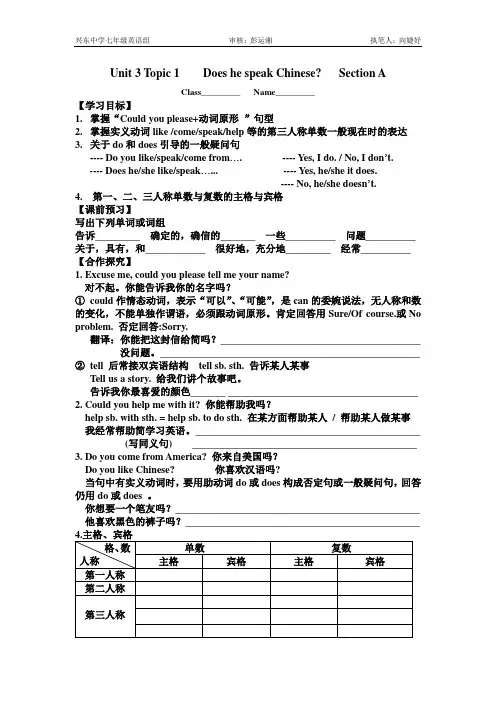
Unit 3 Topic 1 Does he speak Chinese? Section AClass_________ Name_________【学习目标】1.掌握“Could you please+动词原形”句型2.掌握实义动词like /come/speak/help等的第三人称单数一般现在时的表达3.关于do和does引导的一般疑问句---- Do you like/speak/come from…. ---- Yes, I do. / No, I don’t.---- Does he/she like/speak…... ---- Yes, he/she it does.---- No, he/she doesn’t.4. 第一、二、三人称单数与复数的主格与宾格【课前预习】写出下列单词或词组告诉_________ 确定的,确信的_______ 一些__________ 问题__________ 关于,具有,和____________ 很好地,充分地_________ 经常__________ 【合作探究】1. Excuse me, could you please tell me your name?对不起。
你能告诉我你的名字吗?①could作情态动词,表示“可以”、“可能”,是can的委婉说法,无人称和数的变化,不能单独作谓语,必须跟动词原形。
肯定回答用Sure/Of course.或No problem. 否定回答:Sorry.翻译:你能把这封信给简吗?________________________________________ 没问题。
____________________________________________________ ②tell 后常接双宾语结构tell sb. sth. 告诉某人某事Tell us a story. 给我们讲个故事吧。
告诉我你最喜爱的颜色_______ ______________________________________ 2. Could you help me with it? 你能帮助我吗?help sb. with sth. = help sb. to do sth. 在某方面帮助某人/ 帮助某人做某事我经常帮助简学习英语。
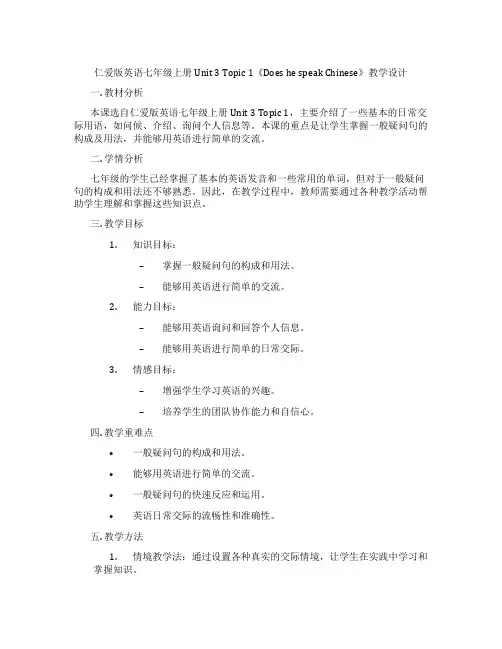
仁爱版英语七年级上册Unit 3 Topic 1《Does he speak Chinese》教学设计一. 教材分析本课选自仁爱版英语七年级上册Unit 3 Topic 1,主要介绍了一些基本的日常交际用语,如问候、介绍、询问个人信息等。
本课的重点是让学生掌握一般疑问句的构成及用法,并能够用英语进行简单的交流。
二. 学情分析七年级的学生已经掌握了基本的英语发音和一些常用的单词,但对于一般疑问句的构成和用法还不够熟悉。
因此,在教学过程中,教师需要通过各种教学活动帮助学生理解和掌握这些知识点。
三. 教学目标1.知识目标:–掌握一般疑问句的构成和用法。
–能够用英语进行简单的交流。
2.能力目标:–能够用英语询问和回答个人信息。
–能够用英语进行简单的日常交际。
3.情感目标:–增强学生学习英语的兴趣。
–培养学生的团队协作能力和自信心。
四. 教学重难点•一般疑问句的构成和用法。
•能够用英语进行简单的交流。
•一般疑问句的快速反应和运用。
•英语日常交际的流畅性和准确性。
五. 教学方法1.情境教学法:通过设置各种真实的交际情境,让学生在实践中学习和掌握知识。
2.任务型教学法:通过完成各种任务,让学生在实际操作中运用所学知识。
3.互动式教学法:鼓励学生积极参与课堂活动,增强课堂互动性。
六. 教学准备1.教材:仁爱版英语七年级上册。
2.多媒体设备:电脑、投影仪等。
3.教学卡片:用于展示关键词和句型。
4.教学道具:如国旗、图片等,用于创设情境。
七. 教学过程1.导入(5分钟)利用多媒体展示一些中国的传统文化和风俗,如春节、中秋节等,引导学生谈论中国文化。
2.呈现(5分钟)教师展示一些图片,如中国人、美国人等,并提问学生:“Do they speak Chinese?”,引导学生回答:“Yes, they do.”或“No, they don’t.”,从而引入一般疑问句的学习。
3.操练(15分钟)教师引导学生进行角色扮演,模拟各种日常交际场景,如在餐馆、机场等地方询问和回答是否会说中文。
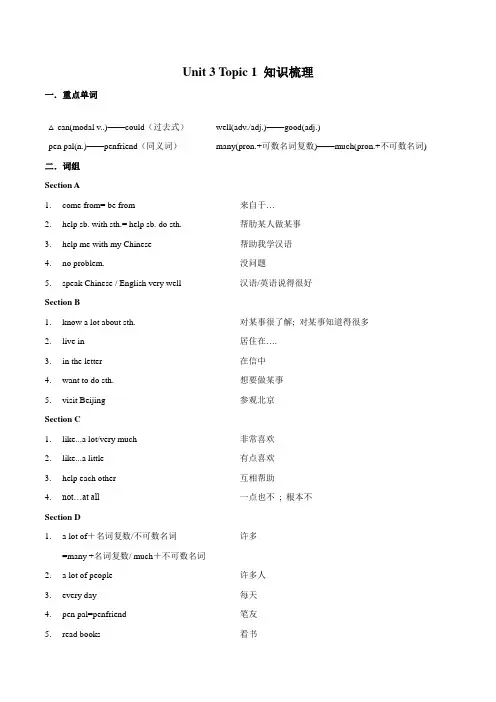
Unit 3 Topic 1 知识梳理一.重点单词△can(modal v..)——could(过去式)well(adv./adj.)——good(adj.)pen pal(n.)——penfriend(同义词)many(pron.+可数名词复数)——much(pron.+不可数名词) 二.词组Section Ae from= be from 来自于…2.help sb. with sth.= help sb. do sth. 帮肋某人做某事3.help me with my Chinese 帮助我学汉语4.no problem. 没问题5.speak Chinese / English very well 汉语/英语说得很好Section B1.know a lot about sth. 对某事很了解; 对某事知道得很多2.live in 居住在….3.in the letter 在信中4.want to do sth. 想要做某事5.visit Beijing 参观北京Section C1.like...a lot/very much 非常喜欢2.like...a little 有点喜欢3.help each other 互相帮助4.not…at all 一点也不; 根本不Section D1. a lot of+名词复数/不可数名词许多=many +名词复数/ much+不可数名词2. a lot of people 许多人3.every day 每天4.pen pal=penfriend 笔友5.read books 看书三.知识点解析Section A1. Excuse me, could you please tell me your name?请您把名字告诉我好吗?“Could you please ...?”是一种常用的委婉、客气的表达请求句型,用来征求别人的意见,是一种较为礼貌的用语,后接动词原形。
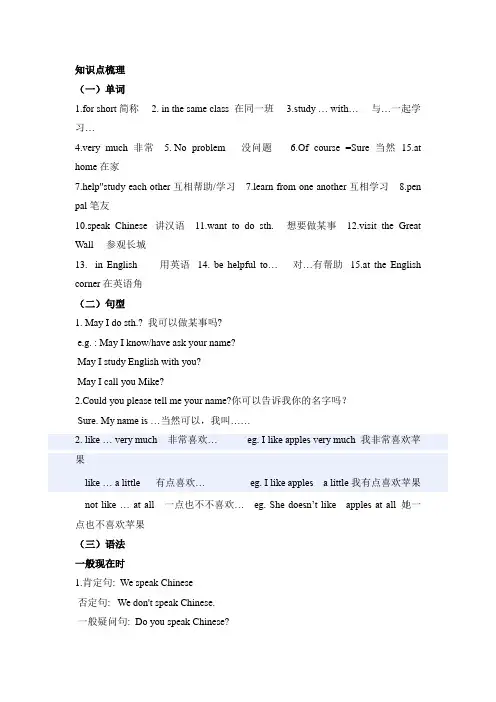
知识点梳理(一)单词1.for short简称2. in the same class 在同一班3.study … with…与…一起学习…4.very much 非常5. No problem 没问题6.Of course =Sure 当然15.at home在家7.help"study each other 互相帮助/学习7.learn from one another互相学习8.pen pal笔友10.speak Chinese 讲汉语11.want to do sth. 想要做某事12.visit the Great Wall 参观长城13. in English 用英语14. be helpful to…对…有帮助15.at the English corner 在英语角(二)句型1. May I do sth.? 我可以做某事吗?e.g. : May I know/have ask your name?May I study English with you?May I call you Mike?2.Could you please tell me your name?你可以告诉我你的名字吗?Sure. My name is …当然可以,我叫……2. like … very much 非常喜欢… eg. I like apples very much 我非常喜欢苹果like … a little 有点喜欢… eg. I like apples a little我有点喜欢苹果not like … at all 一点也不不喜欢… eg. She doesn’t like apples at all 她一点也不喜欢苹果(三)语法一般现在时1.肯定句: We speak Chinese否定句: We don't speak Chinese.一般疑问句: Do you speak Chinese?回答: Yes, we do. No, we don't.2.肯定句: Mike speaks English.否定句: Mike doesn't speak English.一般疑问句: Does Mike speak English?回答: Yes, he does. No, he doesn't.3.动词第三人称单数构成形式:见书本107页代词人称代词: 数/格人称单数复数主格宾格主格宾格第一人称I me we us 第二人称you you you you第三人称hesheit himheritthey them主格:在句中当句子主语e.g. I have a good friend.He has a good friend.宾格: 在句中当动词的宾语或介词的宾语,形成动宾或介宾结构.Please call me Mike. (动宾)Give it (动宾) to me (介宾) .Help us find him. (动宾)人称代词排列顺序:(可记住口诀)you, he and I; we, you and they; he and she口诀:对你尊重you在前,谦虚礼貌I最后;我们人多力量大,we要排在you之前,they委屈垫在后;两性并列不平等,绅士风度放一边,he 在前she在后。
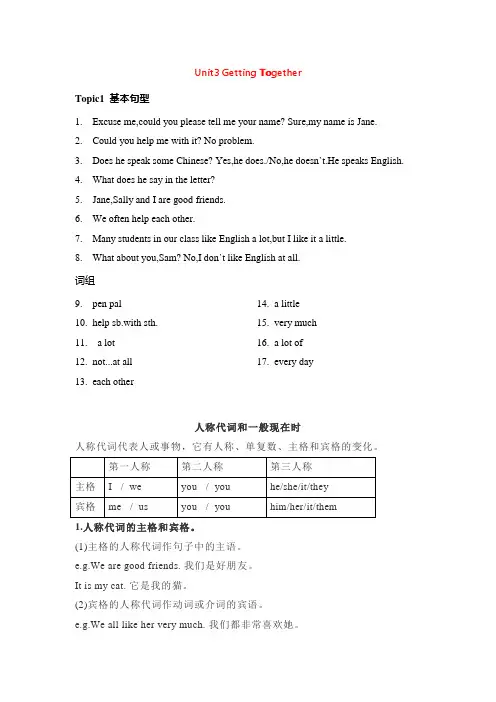
Unit3 Getting TogetherTopic1 基本句型1.Excuse me,could you please tell me your name? Sure,my name is Jane.2.Could you help me with it? No problem.3.Does he speak some Chinese? Yes,he does./No,he doesn`t.He speaks English.4.What does he say in the letter?5.Jane,Sally and I are good friends.6.We often help each other.7.Many students in our class like English a lot,but I like it a little.8.What about you,Sam? No,I don`t like English at all.词组9.pen pal10.help sb.with sth.11. a lot12.not...at all13.each other14.a little15.very much16.a lot of17.every day 人称代词和一般现在时人称代词代表人或事物,它有人称、单复数、主格和宾格的变化。
第一人称第二人称第三人称主格I / we you / you he/she/it/they宾格me / us you / you him/her/it/them1.人称代词的主格和宾格。
(1)主格的人称代词作句子中的主语。
e.g.We are good friends. 我们是好朋友。
It is my cat. 它是我的猫。
(2)宾格的人称代词作动词或介词的宾语。
e.g.We all like her very much. 我们都非常喜欢她。
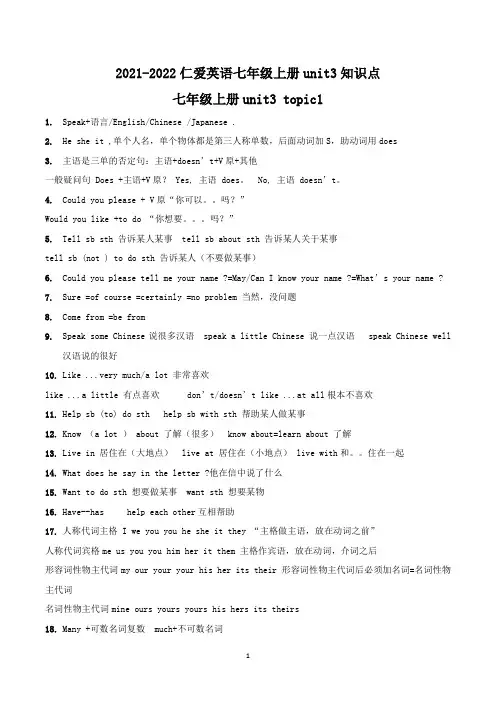
2021-2022仁爱英语七年级上册unit3知识点七年级上册unit3 topic11.Speak+语言/English/Chinese /Japanese .2.He she it ,单个人名,单个物体都是第三人称单数,后面动词加S,助动词用does3.主语是三单的否定句:主语+doesn’t+V原+其他一般疑问句 Does +主语+V原? Yes, 主语 does。
No, 主语 doesn’t。
4.Could you please + V原“你可以。
吗?”Would you like +to do “你想要。
吗?”5.Tell sb sth 告诉某人某事 tell sb about sth 告诉某人关于某事tell sb (not ) to do sth 告诉某人(不要做某事)6.Could you please tell me your name ?=May/Can I know your name ?=What’s your name ?7.Sure =of course =certainly =no problem 当然,没问题e from =be from9.Speak some Chinese说很多汉语 speak a little Chinese 说一点汉语 speak Chinese well汉语说的很好10.Like ...very much/a lot 非常喜欢like ...a little 有点喜欢 don’t/doesn’t like ...at all根本不喜欢11.Help sb (to) do sth help sb with sth 帮助某人做某事12.Know (a lot ) about 了解(很多) know about=learn about 了解13.Live in 居住在(大地点) live at 居住在(小地点) live with和。
住在一起14.What does he say in the letter ?他在信中说了什么15.Want to do sth 想要做某事 want sth 想要某物16.Have--has help each other互相帮助17.人称代词主格 I we you you he she it they “主格做主语,放在动词之前”人称代词宾格me us you you him her it them 主格作宾语,放在动词,介词之后形容词性物主代词my our your your his her its their 形容词性物主代词后必须加名词=名词性物主代词名词性物主代词mine ours yours yours his hers its theirs18.Many +可数名词复数 much+不可数名词some/any+可复数/不可数名词(some用在肯定句或期待得到肯定回答的疑问句中 any用在疑问句或否定句中)a lot of =lots of =plenty of +可复数/不可数19.A lot =very much “非常(句末)”Unit 3Topic 21.问职业:What do/does ...do ?=What’s ...’s /形容词性物主代词 job?=What is/are ...? What’s your father’s job ?=What does your father do ? =What is your father ?What’s his job ?2.Glad to meet you ! =Nice to meet you ! Be glad to do 乐意做某事3.Be home 在家 get home 到家come home回到家go home 回家4.Welcome to ...5.An office worker an actor6.cook 厨师--cooker炉灶 farm农场--farmer农民 teach 教--teacher教师act表演--actor演员 work 工作--worker工人7.In a school on a farm in an office on the sofa8.Show sb sth =show sth to sb向某人展示某物9.give sb sth =give sth to sb 把某物给某人10.Who is the boy in the photo ?照片里的男孩是谁? A photo of my family我的一张全家福11.My grandparents ,my cousin and I I 要放在最后,以示礼貌12.A big family family 指整个家庭谓语用单数指家庭成员时谓语用复数My family is a big family . After supper ,my family often watch TV .13.Sister /brother 姐妹兄弟 cousin表兄弟姐妹14.Like/love to do 偶然的喜欢,想做某事 like/love doing 表示爱好15.Play with 和。
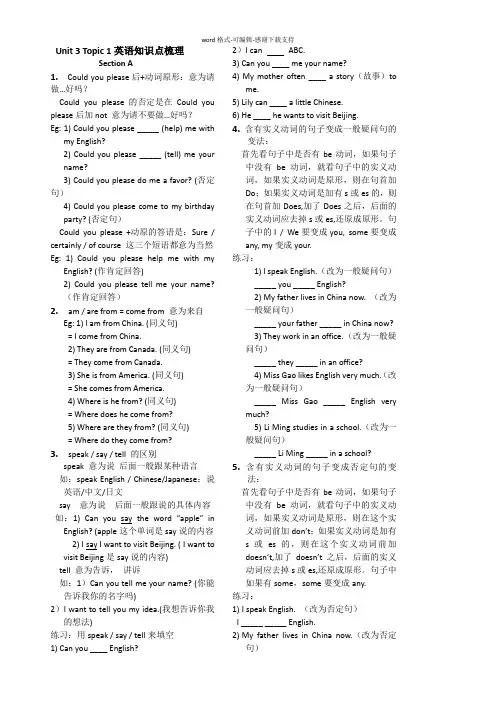
Unit 3 Topic 1英语知识点梳理Section A1. Could you please后+动词原形:意为请做…好吗?Could you please的否定是在Could you please后加not 意为请不要做…好吗?Eg: 1) Could you please _____ (help) me with my English?2) Could you please _____ (tell) me yourname?3) Could you please do me a favor? (否定句)4) Could you please come to my birthdayparty? (否定句)Could you please +动原的答语是:Sure / certainly / of course 这三个短语都意为当然Eg: 1) Could you please help me with my English? (作肯定回答)2) Could you please tell me your name?(作肯定回答)2. am / are from = come from 意为来自Eg: 1) I am from China. (同义句)= I come from China.2) They are from Canada. (同义句)= They come from Canada.3) She is from America. (同义句)= She comes from America.4) Where is he from? (同义句)= Where does he come from?5) Where are they from? (同义句)= Where do they come from?3. speak / say / tell 的区别speak 意为说后面一般跟某种语言如:speak English / Chinese/Japanese:说英语/中文/日文say 意为说后面一般跟说的具体内容如:1) Can you say the word “apple”in English? (apple这个单词是say说的内容2) I say I want to visit Beijing. ( I want tovisit Beijing是say说的内容)tell 意为告诉,讲诉如:1)Can you tell me your name? (你能告诉我你的名字吗)2)I want to tell you my idea.(我想告诉你我的想法)练习:用speak / say / tell来填空1) Can you ____ English? 2)I can ABC.3) Can you ____ me your name?4) My mother often ____ a story(故事)tome.5) Lily can ____ a little Chinese.6) He ____ he wants to visit Beijing.4.含有实义动词的句子变成一般疑问句的变法:首先看句子中是否有be动词,如果句子中没有be动词,就看句子中的实义动词,如果实义动词是原形,则在句首加Do;如果实义动词是加有s或es的,则在句首加Does,加了Does之后,后面的实义动词应去掉s或es,还原成原形。
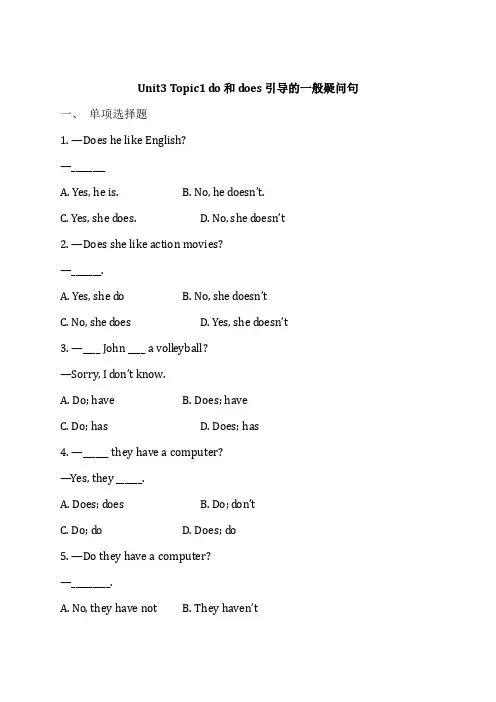
Unit3 Topic1 do和does引导的一般疑问句一、单项选择题1. —Does he like English?—________A. Yes, he is.B. No, he doesn’t.C. Yes, she does.D. No, she doesn’t2. —Does she like action movies?—_______.A. Yes, she doB. No, she doesn’tC. No, she d oesD. Yes, she doesn’t3. —____ John ____ a volleyball?—Sorry, I don’t know.A. Do; haveB. Does; haveC. Do; hasD. Does; has4. —______ they have a computer?—Yes, they ______.A. Does; doesB. Do; don’tC. Do; doD. Does; do5. —Do they have a computer?—_________.A. No, they have notB. They haven’tC. No, they doD. No, they don’t6. Do you ______ your lost keys?A. findB. foundC. lookD. look for7. —______?—Yes, he does.A. Do you like filmsB. Does her father like filmsC. Does these filmsD. Are those films8. —____ you like eggs?—Yes, I ____.A. Do; doB. Are; amC. Does; doesD. Do; am9. —Do you have uniforms?—_______, I _______.A. Yes, don’tB. No, doC. Yes, doesn’tD. No, don’t参考答案及解析1. B 本题中问句的肯定回答用Yes, he does.否定回答用No, he doesn’t.2. B 此题考查一般疑问句的回答。
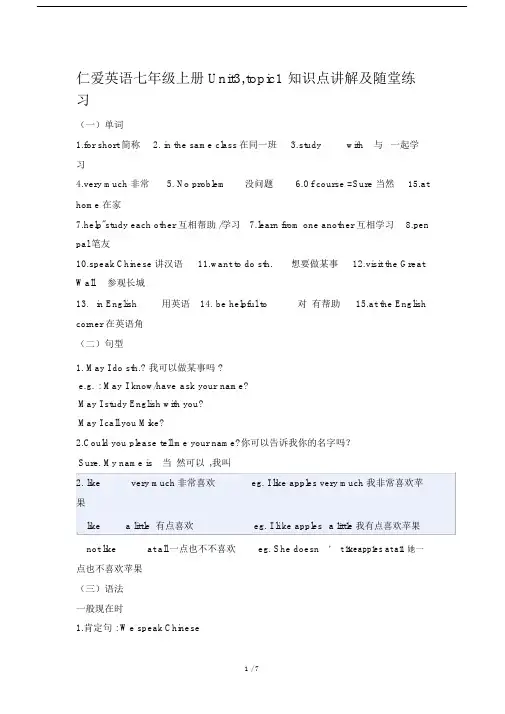
仁爱英语七年级上册 Unit3,topic1 知识点讲解及随堂练习(一)单词1.for short 简称2. in the same class在同一班3.study with 与一起学习4.very much 非常5. No problem没问题6.Of course =Sure 当然15.at home 在家7.help"study each other 互相帮助 /学习7.learn from one another 互相学习8.pen pal 笔友10.speak Chinese 讲汉语11.want to do sth.想要做某事12.visit the Great Wall参观长城13. in English用英语14. be helpful to对有帮助15.at the English corner 在英语角(二)句型1.May I do sth.? 我可以做某事吗 ?e.g. : May I know/have ask your name?May I study English with you?May I call you Mike?2.Could you please tell me your name?你可以告诉我你的名字吗?Sure. My name is当然可以,我叫2. like very much非常喜欢eg. I like apples very much 我非常喜欢苹果like a little 有点喜欢eg. I li ke apples a little 我有点喜欢苹果not like at all一点也不不喜欢eg. She doesn’ t likeapples at all她一点也不喜欢苹果(三)语法一般现在时1.肯定句 : We speak Chinese否定句 : We don't speak Chinese.一般疑问句 : Do you speak Chinese?回答 : Yes, we do. No, we don't.2.肯定句 : Mike speaks English.否定句 : Mike doesn't speak English.一般疑问句 : Does Mike speak English?回答 : Yes, he does. No, he doesn't.3.动词第三人称单数构成形式 :见书本 107 页代词人称代词 : 数/格人称单数复数主格宾格主格宾格第一人称I me we us第二人称you you you you第三人称he him they themshe herit it主格 :在句中当句子主语e.g. I have a good friend.He has a good friend.宾格 : 在句中当动词的宾语或介词的宾语,形成动宾或介宾结构 .Please call me Mike. (动宾 )Give it ( 动宾 ) to me (介宾 ) .Help us find him. (动宾 )人称代词排列顺序:(可记住口诀) you, he and I; we, you and they; he and she 口诀:对你尊重 you 在前 ,谦虚礼貌 I 最后;我们人多力量大 ,we 要排在 you 之前 ,they 委屈垫在后;两性并列不平等 ,绅士风度放一边 ,he 在前 she在后。

2014-2015学年度第一学期英语期末复习Unit 3知识点归纳Topic 1重点句子:1. He can speak some Chinese.2. Do you like Chinese? Yes, I do/ No, I don’t3. What does he say in the letter?4. He wants to visit Beijing.5. Many students in our class like English a lot, but I don’t lik e it at all.6. We are good friends and we help each other.Topic1交际用语:1. Excuse me, could you please tell me your name? Sure.2. Could you help me with it.? No problem.3. Do you like English? Yes, I like it very much/a lot/ a little4. Oh, he can hel p you wih your English. Yes, you’re right.Topic1语法:1.表示”喜欢”的程度I like it very much/a lot/ alittle. I don’t like it at all.like…a lot 表示“对某件事有浓厚的兴趣”,与like …very much同义。
而表示“有点兴趣”,用like…a little.表示“对…没有一点兴趣”用not like…at all.如:I like Chinese a little/a lot/very much.我有点/非常喜欢汉语。
I don’t like maths at all. 我根本不喜欢数学。
2.人称代词的用法:人称代词分为主格和宾格**动词/介词+ 代词的宾格Topic 1语法剖析:1.“Could you please+动词原形+其他?”用于礼貌的请求别人做某事,译成“你能….吗?肯定答语用Sure/Of course.或No problem.否定答语用Sorry.2.speak 表示说、讲(某种语言),演讲。
Unit3 Getting Together重要知识点讲解Topic 1一、用Do/Does开头的一般疑问句询问某人是否能够做某事的句型-Does he speak Chinese?他会说中文吗?-No, he doesn't. He speaks English.不,他不会。
他说中文。
[点拨]"Do/Does+主语+动词原形+其他?"用于询问某人是否能够做某事的句型。
Do/Does分别是助动词的原形和单数形式,其数和主语的人称和数保持一致。
该句子的回答形式为:(肯定)Yes,主语+do/does.(否定)No,主语+don't/doesn't.二、询问某人想要做什么的句型-What does he want to do?他想要做什么?-He wants to visit Beijing.他想游览北京。
[点拨]"What do/does+主语+want to do?"用于询问某人想要做什么。
该问句是以Wh-开头的特殊疑问句。
助动词的单复数与主语的人称和数保持一致。
三、人称代词[点拨]人称代词分为两类;(1)主格代词:I,we,you,he,she,it,they.(2)宾格代词:me,us,you,him,her,it,them.用法可以遵循以下口诀:人称代词分两格,主格宾格来分说;主格定把主语做,宾格作宾不会错。
四、委婉的请求对方做某事的句型—Could you please tell me your name?请问你能告诉我你的名字吗?-Sure. My name is Lily。
当然可以,我叫莉莉。
[点拨]"Could you please+动词原形?"用于委婉的请求对方做某事。
该句的回答形式:(肯定)Sure./Of course./No problem.能。
(否定)Sorry.不能。
五、help一词的用法搭配He always helps with the housework.他总是帮着做家务。
(直打版)仁爱英语七年级上册Unit3,topic1知识点讲解及随堂练习(word版可编辑修改)编辑整理:尊敬的读者朋友们:这里是精品文档编辑中心,本文档内容是由我和我的同事精心编辑整理后发布的,发布之前我们对文中内容进行仔细校对,但是难免会有疏漏的地方,但是任然希望((直打版)仁爱英语七年级上册Unit3,topic1知识点讲解及随堂练习(word版可编辑修改))的内容能够给您的工作和学习带来便利。
同时也真诚的希望收到您的建议和反馈,这将是我们进步的源泉,前进的动力。
本文可编辑可修改,如果觉得对您有帮助请收藏以便随时查阅,最后祝您生活愉快业绩进步,以下为(直打版)仁爱英语七年级上册Unit3,topic1知识点讲解及随堂练习(word版可编辑修改)的全部内容。
知识点梳理(一)单词1。
for short简称2。
in the same class 在同一班3。
study … with… 与…一起学习…4。
very much 非常 5. No problem 没问题 6.Of course =Sure 当然 15。
at home在家7.help"study each other 互相帮助/学习 7。
learn from one another互相学习8.pen pal笔友10.speak Chinese 讲汉语 11。
want to do sth. 想要做某事 12.visit the Great Wall 参观长城13。
in English 用英语14. be helpful to… 对…有帮助 15.at the English corner 在英语角(二)句型1。
May I do sth。
?我可以做某事吗?e.g. : May I know/have ask your name?May I study English with you?May I call you Mike?2.Could you please tell me your name?你可以告诉我你的名字吗?Sure. My name is …当然可以,我叫……2。
仁爱版(京教)七年级上Unit3Topic1语法专练:do和does小练一、按要求转换句型1.We like English.(改为一般疑问句)________you________English?2.He wants to visit the Great Wall.(改为一般疑问句)________he________to visit the Great Wall?3.They speak English.(改为否定句)They________________English.4.She works on a farm.(改为否定句)She________________on a farm.5.Do you like Chinese food?(作否定回答)________,I________.6.Does Jim have a pet dog?(作肯定回答)________,he________.7.She usually has milk and bread for breakfast.(对划线部分提问)________________she usually________for breakfast?8.They work in the hospital.(对划线部分提问)___________they________?9.I come from Canada.(改为否定句)I________________from Canada.10.He lives in Chongqing.(改为否定句)________________________in Chongqing.二、根据汉语意思完成下列句子(每空一词)1.她是做什么工作的?What________she________?2.李明和王宏有蛋糕吗?________Li Ming and Wang Hong________cakes?3.他的父母都都在学校工作吗?________his parents work in a school?4.—你喜欢看电视吗?—是的,我喜欢。
Unit3. Topic1. Do you like English?一.核心词汇could tell sure speak some pour with problem pet often want live say visitgreat wall many lot all so study little them very much home its dog any of二.常用词组penpalhelp sb withsthwant to dosththe Great Wall a lot not⋯atall eachother a little very much at home三.重点句子 He can speak some Chinese. Do you like Chinese? Yes, I do/ No, I don ’tWhat does he say in the letter? He wants to visit the Great Wall. Many students in our classlike English a lot, but I don ’tlike it at all. And I help her study Chinese. We help each other.四.交际用语Excuse me, could you please tell me yourname? Sure. Could you help mewith it. No problem. Do you like English? Yes, I like it very much/a lot/ a little. 五.语法精粹do 和 does 引导的一般疑问句及其肯定和否定回答Do you want a pen pal? Yes, I do./No, I don ’t. Does he speak Chinese? Yes, he does./ No, hedoesn ’t. 表示喜欢的程度 I like it very much/a lot/ alittle. I don ’tlike it atall. 人称代词的用法六.其他情态动词 could 的运用学习辅音音标 /tr/ /dr/ /ts/ dz/七.金点剖析1.Excuse me, could you please tell me your name? 打扰一下,请把你的名字告诉我好吗?(1)“ Could youplease+ 动词原形 +其他?”用于礼貌的请求别人做某事,译成“你能,.吗?肯定答语用Sure/Of course. 或 No ,problem 。
仁爱版精品英语资料(精校版)
Unit3 Topic1 do和does引导的一般疑问句
一、单项选择题
1. —Does he like English?
—________
A. Yes, he is.
B. No, he doesn’t.
C. Yes, she does.
D. No, she doesn’t
2. —Does she like action movies?
—_______.
A. Yes, she do
B. No, she doesn’t
C. No, she does
D. Yes, she doesn’t
3. —____ John ____ a volleyball?
—Sorry, I don’t know.
A. Do; have
B. Does; have
C. Do; has
D. Does; has
4. —______ they have a computer?
—Yes, they ______.
A. Does; does
B. Do; don’t
C. Do; do
D. Does; do
5. —Do they have a computer?
—_________.
A. No, they have not
B. They haven’t
C. No, they do
D. No, they don’t
6. Do you ______ your lost keys?
A. find
B. found
C. look
D. look for
7. —______?
—Yes, he does.
A. Do you like films
B. Does her father like films
C. Does these films
D. Are those films
8. —____ you like eggs?
—Yes, I ____.
A. Do; do
B. Are; am
C. Does; does
D. Do; am
9. —Do you have uniforms?
—_______, I _______.
A. Yes, don’t
B. No, do
C. Yes, doesn’t
D. No, don’t
参考答案及解析
1. B 本题中问句的肯定回答用Yes, he does.否定回答用No, he doesn’t.
2. B 此题考查一般疑问句的回答。
用Does提问,肯定回答为“Yes, ...does.”,否定回答为“No, ...doesn’t.”。
3. B 问句中的John为第三人称单数,所以第一空应用助动词Does;且助动词后应用动词原形,故选B。
4. C 主语是they,谓语动词是have,因此用助动词do构成一般疑问句,其肯定答语是“Yes,they do.”。
5. D 含实义动词的一般现在时的一般疑问句的回答应借助助动词。
No为否定回答,其答语中须含有not。
6. A 结合选项可知题意为“你找到丢失的钥匙了吗”,表示找的结果,且句子
开头用了助动词,所以用动词原形find。
7. B 由答语“Yes, he does.”可知问句应为一般疑问句,且一般疑问句中的主语为第三人称单数,谓语为实义动词。
8. A 问句中有实义动词like,且主语是第二人称,故助动词用do,答语的助动词也用do。